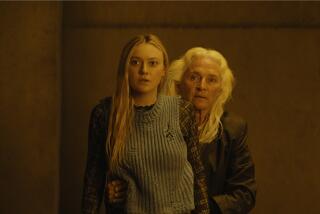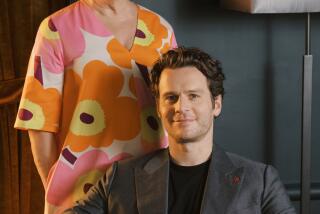Review: Radical author ‘Mary Shelley’ and an excellent Elle Fanning deserve a more adventurous telling
- Share via
“Mary Shelley” conjures up images of a lumbering, disfigured, greenish-skinned monster of a man. That monster, now a cultural icon of horror films for over a century, and his mad scientist creator, Dr. Frankenstein, were dreamed up by the young Mary Shelley in her 1818 horror/fantasy novel, “Frankenstein; or, the Modern Prometheus.”
Haifaa al-Mansour’s biopic of the writer, “Mary Shelley,” starring Elle Fanning, attempts to make some sense out of Shelley’s remarkable, wild life, tracing the upbringing and romantic foibles that led her to create one of the most indelible fictional creatures of all time. With a few careful nips and tucks to the real story, the film presents Mary as the very first in a long line of moody, macabre young women who have churned their angst into popular horror and fantasy fiction. It also seeks to position “Frankenstein” as an ultimately feminist text, an interesting concept the film tends to aggressively overargue.
Mary Wollstonecraft Godwin was born ahead of her time. Her mother, a writer and women’s rights advocate, died when Mary was only a few weeks old, and her father, philosopher, writer and publisher William Godwin (played by Stephen Dillane), educated his daughter well. At 17, Mary ran away with her lover, the Romantic poet Percy Shelley, and the fraught love affair becomes the cornerstone of the script by Emma Jensen. As portrayed by the beautiful Douglas Booth, it’s not hard to imagine falling for the poet, even though he reveals himself to be an emotionally manipulative narcissist, raving about “free love” while cheating on Mary with her stepsister, Claire (Bel Powley).
Although he never respects her as a partner, Percy believes in Mary’s talent as a writer. She furtively scribbles wherever and whenever she can, scraps of writing lamenting her sorrow and her bliss — her frustration with Percy, grief for the loss of her mother, and devastation after the death of her baby, Clara. As Al-Mansour depicts it, the tumultuous stew of emotions inside Mary grows to a roiling boil before it all comes pouring out. Inspired by a ghost story competition to wile away the hours during a rainy day at the Geneva estate of Lord Byron (Tom Sturridge), and informed by her interest in scientific displays of “galvanism” (or reanimation), Mary writes “Frankenstein” from her deep sense of loneliness and abandonment.
The ethereal Fanning is excellent as always as the flushed, then fierce, Mary. Early on, her father sends her to Scotland to put some space between her and her stepmother (Joanne Froggatt), but also, he says, to “find her own voice.” The film follows that process, as she discovers her writer’s voice, and how to use her own voice to speak up.
The film is beautiful, a richly designed and photographed period piece. But where “Mary Shelley” falters is in its lack of focus and gratuitous need to overexplain everything. There’s very little subtext or details to be gleaned — it’s all on the surface. And for such a radical woman leading such a radical life, Al-Mansour and Jensen have trimmed too much. The reality is much more fascinating and messy than this sanitized version, which tries to stick this complicated and unconventional woman into a staid romantic drama. The film celebrates Mary Shelley for the trailblazing woman that she is, but hews far too close to convention to truly represent her life.
Walsh is a Tribune News Service film critic.
------------
‘Mary Shelley’
Rated: PG-13, for sexuality and thematic elements including substance abuse.
Running time: 2 hours
Playing: Laemmle Monica Film Center, Santa Monica
See the most-read stories in Entertainment this hour »
Movie Trailers
More to Read
Only good movies
Get the Indie Focus newsletter, Mark Olsen's weekly guide to the world of cinema.
You may occasionally receive promotional content from the Los Angeles Times.










